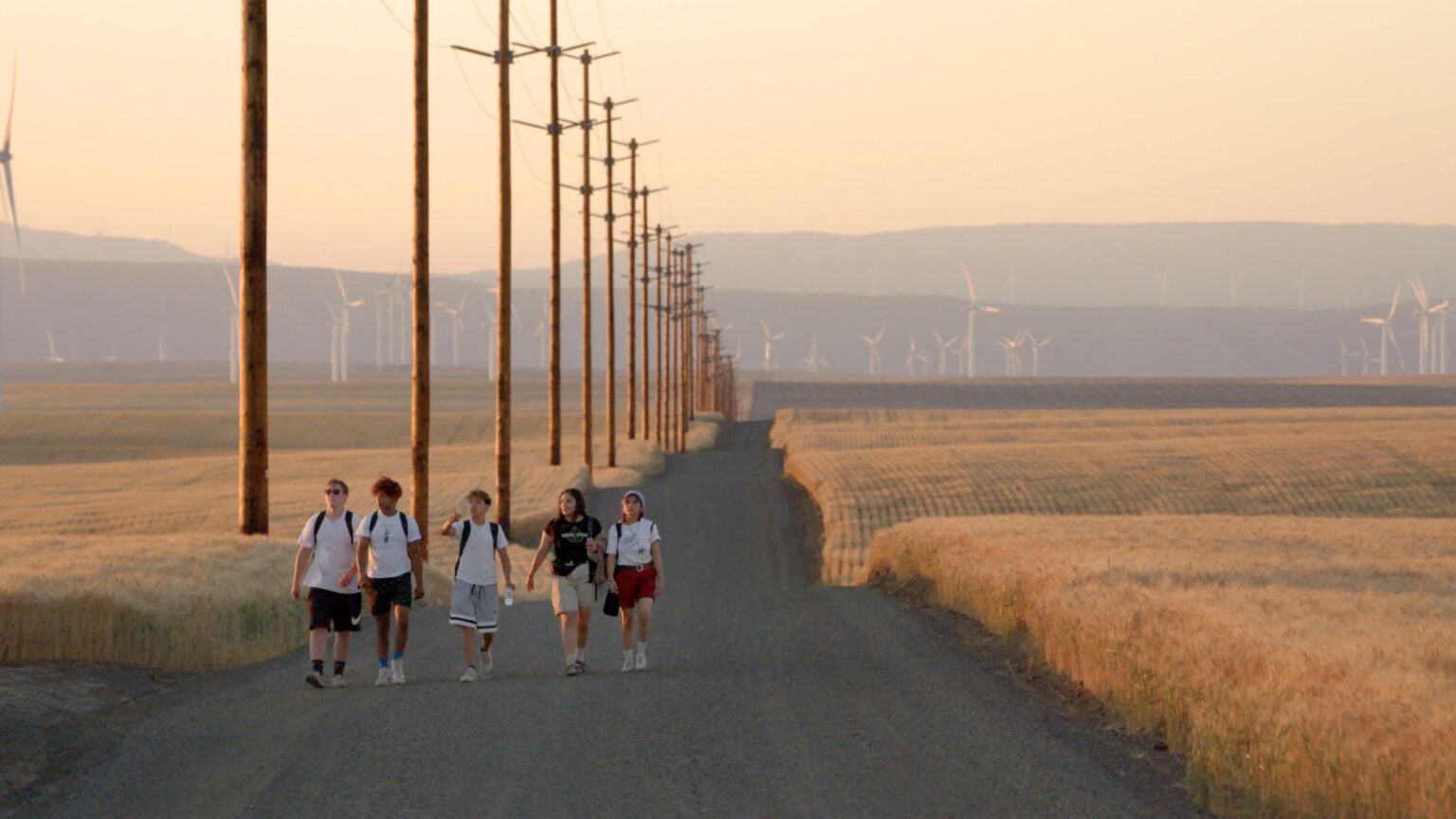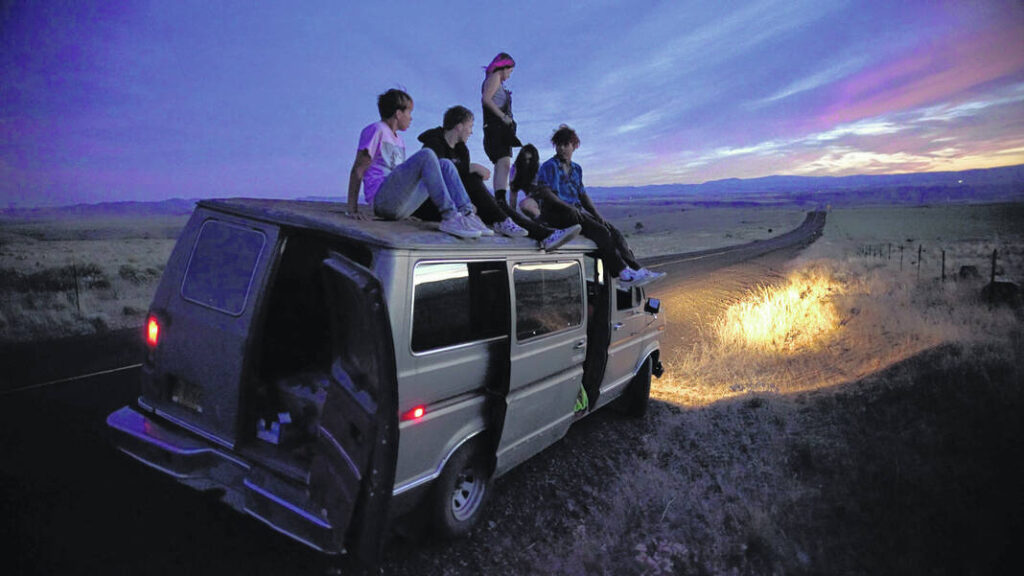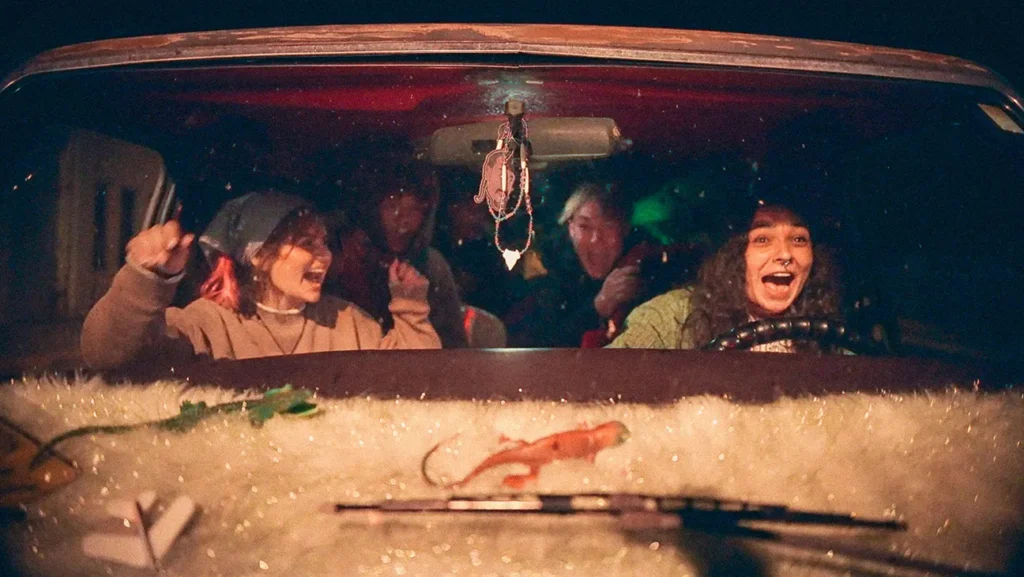
Gasoline Rainbow (2023)
- by admin
- Posted on 26 August, 2024
Deadass lovely
I’ll tell you something, Micah. This is the big difference between grown-ups and children: Grown-ups aren’t supervised. That’s it.
I often praise the writing for teen films if it manages to sound organic rather than pandering or artificial. But there is a flip side to a film pulling off naturalism too well, and that is that many teenagers are inarticulate idiots. This isn’t really their fault. Their brains aren’t fully developed, but they’re thrust into grown-up bodies and need to tackle grown-up situations for the first times. They will stumble through those scenarios, and they will discover and define themselves in the process. That’s part of what makes them compelling film subjects and compelling people. At any moment, the most raw, touching, profound observations on life might spill out of their mouths. But in reality, every piercing insight or remarkable turn of phrase going to be padded with drivel — even if there’s occasional poetry in that drivel. That’s just the way youth is.
Thus is the beautiful problem with Gasoline Rainbow. This lyrical, magical teen film by the Ross brothers so commits to its realist ethos that much of what its characters have to say is tedious piffle and dead air. Because, you know, that’s how teens talk in real life. To quote a Letterboxd review: “Every time they said ‘deadass,’ I think I lost a few brain cells.”

The story follows five teens who go on a road trip from an Oregon small town to the Pacific coast shortly after their high school graduation. The characters share names with their non-professional actors: Micah Bunch, Nathaly Garcia, Nichole Dukes, Tony Aburto, and Makai Garza. The group don’t have much in common except that they feel trapped in their one-horse podunk hometown. We follow them every step of the trip as if this is a documentary of a real teenage odyssey. And there’s at least a kernel of truth to that idea: the Ross brothers let the cast bring their own definition to the characters and encouraged them to react authentically to the scenarios they encountered.
Their destination is a fabled beach party known as “The End of the World,” and, I mean, that pretty much says it all. The teens view the trip as the apocalypse of their own youth, speaking of what happens after in tones of dread: “Get a job” and “settle down” and all that.
Gasoline Rainbow was filmed in 2021 which is also when it’s set, and though it’s never directly mentioned, the shadow of COVID hangs over the whole story: each of the kids is processing the mild-to-moderate trauma amplified by being stuck in isolation during some key formative years; yet they’re bound with an “all-in-this-together” spirit that colored discourse of the early pandemic. They all comment on feeling a lack of physical space to be themselves and call their own, hence the desire to escape outside — and to stay outside. Almost the entirety of the film takes place outdoors or in a vehicle.

But those themes are not really new ones for coming of age stories, and that’s one thing I really love about Gasoline Rainbow: In its 2020s specificity it rediscovers truths that lie at the heart of most great coming of age stories as well as great road stories: Those old chestnuts about accepting yourself for who you are, living in the moment, and rolling with the punches to find the beauty in life.
Gasoline Rainbow finds a new and hopeful Americana where outsiders of all ilk lend a helping hand to each other even as the institutions surrounding them decay and dehumanize. Barriers between social strata blur, like this is the anti-Breakfast Club. By focusing on youth and the disenfranchised, it’s inherently a political film. But it doesn’t dwell on the politics, instead offering an American portrait of fundamental decency and openness. Homeless, transient young adults offer advice on rail hopping; metalheads monologue on the virtues of Tom Bombadil as they cook scrambled eggs the morning after a party; skateboarders double as street corner poets; and everyone has a Spotify playlist that’s a key part of their personal identity. Nobody wears out their welcome.
The Ross brothers, famous for their slice-of-life documentaries including bar tribute Bloody Nose, Empty Pockets, depict the teens’ quest with astonishingly lovely filmmaking. They capture the Oregon landscape with tender, curious eyes. They soak in the literal and figurative color of each setting, from the spacious, rolling hills of the highway, through the streetlamp-lit gas stations, through the grungy streets of Portland, to, indeed, a campfire illuminating an epic party at the end of the world. I’m not entirely sold on their mixed media touches that intersperse stills and handheld cast-captured phone footage with their own terrific camerawork, but it certainly adds to film’s sense of being a collage of perspectives.

It’s clear the Ross brothers also didn’t quite know how to end the film. They instead offer up a bunch of different ending images as if unable to find one that really felt right as a conclusion, so here, have them all: fire, ashes, faces, landscapes, sunrises, churning waves. My favorite shot of the closing minutes is a burning piano on the beach, an undefinable and memorable image. The very last shot is a blinking streetlight that evokes a modern, upside down version of the finale of Great Gatsby.
I’m not sure how rewatchable Gasoline Rainbow will be as time passes. The characters are nowhere near as sharply defined or compelling as the best teen movies. The improvisational dialogue, as noted, lacks the brilliant punch and depth of the best hangout jams. But I really think there’s something here, a sweeping and optimistic lens on disaffected youth. Gasoline Rainbow is just like the phenomenon of its title: ephemerally beautiful.
Deadass lovely I’ll tell you something, Micah. This is the big difference between grown-ups and children: Grown-ups aren’t supervised. That’s it. I often praise the writing for teen films if it manages to sound organic rather than pandering or artificial. But there is a flip side to a film pulling off naturalism too well, and…